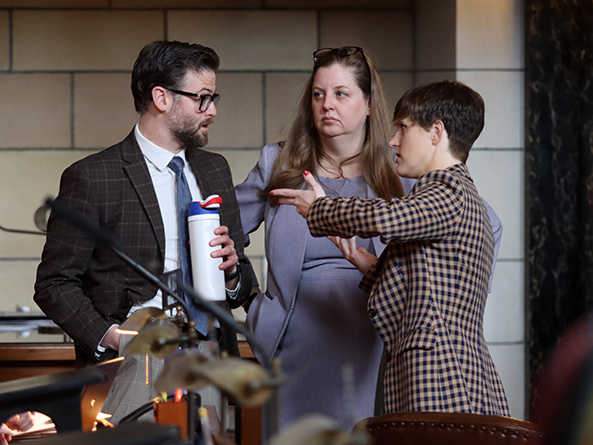Tenant ‘clean slate’ proposal stalls on first round
A measure that would allow certain eviction proceeding records to be sealed failed to advance from general file March 7 after an unsuccessful motion to end debate on the bill.

LB175, as introduced by Lincoln Sen. George Dungan, would allow tenants to receive “clean slate” relief — or the automatic sealing of the court record — if a trial court issues an order dismissing an eviction proceeding against them. It also would create a process for tenants to seek clean slate relief under certain circumstances, including instances when an eviction was initiated but not carried out or was later reversed or vacated.
Dungan said the bill aimed to seal court records of cases that do not result in judgment or conviction, mirroring existing practice in criminal cases. He also said LB175 would prevent people who ultimately were not evicted from having their housing options limited by that information remaining part of the public record.
“The goal of this bill is simply to ensure that the court history of an individual accurately reflects the outcome of their court proceedings,” Dungan said.
A pending Judiciary Committee amendment would remove a provision in the bill allowing tenants to request clean slate relief. It also would add provisions of Dungan’s LB1115, giving landlords and tenants the right to request a jury trial in eviction proceedings.
Omaha Sen. Justin Wayne, chairperson of the committee, supported the bill and the amendment. The inclusion of LB1115 is necessary, he said, due to a Nebraska Supreme Court ruling last year indicating that the Uniform Residential Landlord and Tenant Act likely is unconstitutional because it does not provide for jury trials.
Wayne also warned that inaction by the Legislature to permit jury trials in eviction proceedings could result in lawmakers needing to reconvene for a special session later this year.
“[In] September or October, we will be here on a special session,” he said. “So when you’re thinking about having to harvest and all that during that time, we’re going to have 1,000 jury trials pending in Douglas County, Lancaster County and Sarpy County that we will not have a solution for.”
Omaha Sen. Wendy DeBoer also spoke in support of the bill and the amendment. Like Wayne, she raised concerns that a crisis could ensue if the landlord-tenant act is struck down, overwhelming the courts with jury trials. Landlords would face delays in the eviction process, DeBoer said, making the removal of tenants from their property more difficult.
“We’ve got to have some guardrails,” she said. “We’ve got to have some ability to provide for these situations with some protections for the courts and protections for everyone involved.”
Elkhorn Sen. Lou Ann Linehan also supported the bill and said that judgments from eviction proceedings often disproportionately favor landlords.
“This results in moms with little kids getting evicted in December, January [and] February,” she said. “Until we come up with some program where that doesn’t happen, we need to pass this bill.”
Sen. Julie Slama of Dunbar opposed the bill and the amendment, saying the measure would prevent landlords from accessing information about potential tenants and erode personal property rights. She also rejected the prediction that the Nebraska Supreme Court would declare the entire Uniform Residential Landlord and Tenant Act unconstitutional.
“It’s kind of absurd to claim the Nebraska Supreme Court’s just going to come in with an Uzi and claim that the entire landlord-tenant act is unconstitutional,” she said. “When it comes to this issue on right of a jury trial, I’ve reviewed the cases, I’ve reviewed their opinions … they’re not going to come in and rule this en masse unconstitutional.”
Elkhorn Sen. R. Brad von Gillern also opposed the measure. He said that, as a landlord, he had encountered tenants who were destructive and negligent. Landlords should have access to potential tenants’ information so they can make an informed decision about who they rent to, von Gillern said.
Dungan offered a compromise amendment that he said stakeholders had agreed upon. The amendment, adopted 32-11, would narrow the proposal to provide clean slate relief to tenants only once and would remove provisions of LB1115 from the committee amendment.
The amendment also would add provisions from Norfolk Sen. Robert Dover’s LB1312, which would allow electronic communication between landlords and tenants in certain circumstances.
Dungan said the changes would balance the interests of tenants and landlords while protecting property owners from bad actors. Slama remained opposed, however, and filed a series of amendments and motions to extend debate and keep the measure from reaching a vote.
After eight hours of debate, Dungan offered a motion to invoke cloture, which ends debate and forces a vote on the bill and any pending amendments.
The cloture motion failed 30-16. Thirty-three votes were needed. A failed cloture motion results in debate on a proposal ceasing for the day. LB175 is unlikely to be placed on the agenda again this session.


